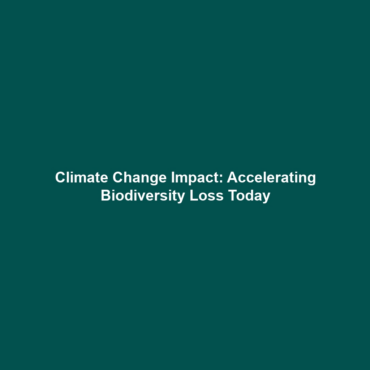How Climate Change Accelerates Biodiversity Loss
Climate change is a critical issue that directly impacts biodiversity, significantly contributing to habitat alteration, extreme weather events, and increased temperatures. Understanding how climate change accelerates biodiversity loss is essential for addressing the broader implications of deforestation and biodiversity loss. With ecosystems under siege, it is crucial to explore the pathways through which climate change modifies habitats, threatens species, and alters ecological interactions.
Key Concepts
Numerous scientific principles illustrate how climate change is intricately linked to biodiversity loss:
- Changing Habitats: Climate change alters ecosystems by shifting temperature and precipitation patterns, making some areas inhospitable for many species.
- Extreme Weather Events: Increased frequency of extreme weather, such as hurricanes, floods, and droughts, results in habitat destruction and increased mortality rates among species.
- Rising Temperatures: Higher temperatures can disrupt breeding cycles, migration patterns, and food availability for various organisms, leading to species decline.
These concepts are essential when considering the broader context of deforestation and biodiversity loss, as they highlight the interdependent relationship between changes in the environment and ecological stability.
Applications and Real-World Uses
Understanding how climate change accelerates biodiversity loss has significant applications in conservation biology and environmental policy:
- Conservation Planning: Policymakers utilize climate impact assessments to design effective conservation strategies that account for future climate scenarios.
- Habitat Restoration: Restoration efforts are guided by knowledge of how climate influences ecosystems, allowing for the revival of degraded habitats.
- Ecological Research: Studies on species’ responses to climate change inform biodiversity assessments and protection initiatives.
These applications clearly demonstrate how understanding the impact of climate change is instrumental in addressing issues related to deforestation and biodiversity loss.
Current Challenges
Despite the advances in research, several challenges and limitations exist in studying and applying solutions related to biodiversity loss:
- Data Gaps: Insufficient long-term ecological data hampers effective modeling of climate change effects on biodiversity.
- Mitigation Strategies: Difficulty in developing comprehensive strategies that account for multiple species and habitat types.
- Political Will: Varying levels of commitment among nations to implement necessary changes for biodiversity conservation.
These challenges underscore the complexity of addressing the multifaceted issues intrinsic to climate change and biodiversity loss.
Future Research and Innovations
Future research will focus on innovative approaches to mitigating the impact of climate change on biodiversity:
- Next-Gen Conservation Technologies: The use of remote sensing and AI to monitor biodiversity changes in real-time.
- Biosphere Resilience Studies: Research aimed at understanding how ecosystems can adapt to rapid environmental changes.
- Climate Resilience Programs: Initiatives that aim to enhance the adaptive capacity of ecosystems and species to withstand climate change effects.
Such innovations are essential for advancing our understanding and management of biodiversity loss in a changing climate.
Conclusion
In summary, climate change is rapidly accelerating biodiversity loss through mechanisms such as habitat change, extreme weather events, and rising temperatures. Addressing these challenges is crucial for mitigating the impacts of deforestation and preserving biodiversity for future generations. For further reading on biodiversity conservation strategies and climate change impacts, visit our related articles page.

Leave a Reply